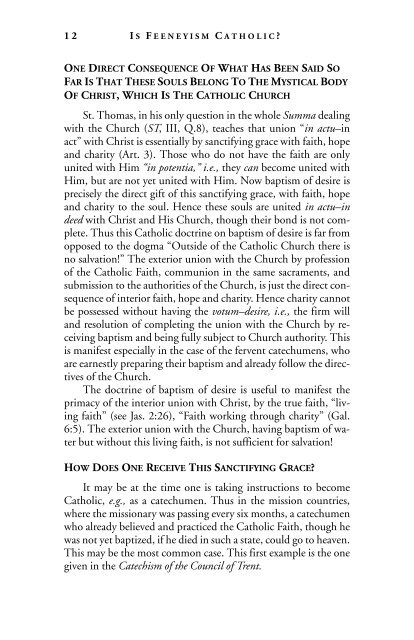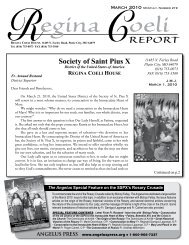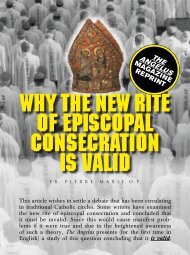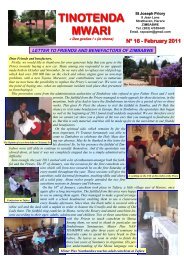Is Feeneyism Catholic? - Society of St. Pius X
Is Feeneyism Catholic? - Society of St. Pius X
Is Feeneyism Catholic? - Society of St. Pius X
You also want an ePaper? Increase the reach of your titles
YUMPU automatically turns print PDFs into web optimized ePapers that Google loves.
12 IS F EENEYISM C ATHOLIC?<br />
ONE DIRECT CONSEQUENCE OF WHAT HAS BEEN SAID SO<br />
FAR IS THAT THESE SOULS BELONG TO THE MYSTICAL BODY<br />
OF CHRIST, WHICH IS THE CATHOLIC CHURCH<br />
<strong>St</strong>. Thomas, in his only question in the whole Summa dealing<br />
with the Church (ST, III, Q.8), teaches that union “in actu–in<br />
act” with Christ is essentially by sanctifying grace with faith, hope<br />
and charity (Art. 3). Those who do not have the faith are only<br />
united with Him “in potentia,” i.e., they can become united with<br />
Him, but are not yet united with Him. Now baptism <strong>of</strong> desire is<br />
precisely the direct gift <strong>of</strong> this sanctifying grace, with faith, hope<br />
and charity to the soul. Hence these souls are united in actu–in<br />
deed with Christ and His Church, though their bond is not complete.<br />
Thus this <strong>Catholic</strong> doctrine on baptism <strong>of</strong> desire is far from<br />
opposed to the dogma “Outside <strong>of</strong> the <strong>Catholic</strong> Church there is<br />
no salvation!” The exterior union with the Church by pr<strong>of</strong>ession<br />
<strong>of</strong> the <strong>Catholic</strong> Faith, communion in the same sacraments, and<br />
submission to the authorities <strong>of</strong> the Church, is just the direct consequence<br />
<strong>of</strong> interior faith, hope and charity. Hence charity cannot<br />
be possessed without having the votum–desire, i.e., the firm will<br />
and resolution <strong>of</strong> completing the union with the Church by receiving<br />
baptism and being fully subject to Church authority. This<br />
is manifest especially in the case <strong>of</strong> the fervent catechumens, who<br />
are earnestly preparing their baptism and already follow the directives<br />
<strong>of</strong> the Church.<br />
The doctrine <strong>of</strong> baptism <strong>of</strong> desire is useful to manifest the<br />
primacy <strong>of</strong> the interior union with Christ, by the true faith, “living<br />
faith” (see Jas. 2:26), “Faith working through charity” (Gal.<br />
6:5). The exterior union with the Church, having baptism <strong>of</strong> water<br />
but without this living faith, is not sufficient for salvation!<br />
HOW DOES ONE RECEIVE THIS SANCTIFYING GRACE?<br />
It may be at the time one is taking instructions to become<br />
<strong>Catholic</strong>, e.g., as a catechumen. Thus in the mission countries,<br />
where the missionary was passing every six months, a catechumen<br />
who already believed and practiced the <strong>Catholic</strong> Faith, though he<br />
was not yet baptized, if he died in such a state, could go to heaven.<br />
This may be the most common case. This first example is the one<br />
given in the Catechism <strong>of</strong> the Council <strong>of</strong> Trent.











